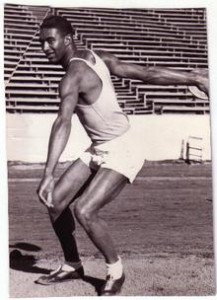New Entries at twilightandreason.com
Edward Breathitte Sellers, Wheaton Class of 1866
(Source: ReCollections, the official blog of the Wheaton College Archives & Special Collections)
Here are some of the latest entries to the Black Milestones in Higher Education timeline that I maintain over at Twilight and Reason (twilightandreason.com). If you know of any milestones or firsts that I have not included, please let me know. I am always open to suggestions for new entries to the timeline:
- 1866 — Edward Breathitte Sellers becomes the first African American to graduate from Wheaton College in Illinois.
- 1933 — Claude Walton becomes the first African American to earn a varsity letter at the University of Colorado (track and field:discus). In 1936 he would become the first University of Colorado athlete to win All-American honors in any sport (discus).
Claude Walton at the University of Colorado (Source: Daily Camera Online)
- 1955 — Frank Clarke becomes the first African American to earn a varsity letter in football at the University of Colorado.
- 1957 — Aubrey Lewis, Sr. becomes the first African American to serve as captain of a Notre Dame athletic team (track and field).
- 1966 — Miriam DeCosta-Willis becomes the first African American faculty member at Memphis State University (now the University of Memphis).
- 1967 — Daphne Maxwell Reid becomes Northwestern University’s first African American Homecoming Queen. Miriam DeCosta-Willis becomes the first African American woman to earn a Ph.D. at Johns Hopkins University (Romance Languages).
- 1975 — Thom Gossom, Jr. becomes the first African American athlete to graduate from Auburn University.
- 1976 — Mary Frances Berry becomes the first and only African American and the first and only woman ever appointed Chancellor of the University of Colorado.
Mary Frances Berry (Source: Indiana University Northwest)
- 1979 — Willie Jeffries becomes the first African American head football coach at a Division I school (Wichita State).
- 2004 — Sylvester Croom becomes the first African American head football coach in the Southeastern Conference (SEC).
- 2007 — The Northwestern University Black Alumni Association (NUBAA) inducts its first group of honorees into the NUBAA Hall of Fame.
Posted by Ajuan Mance
Posted in Academia, African Americans, Black Alumni, Black athletes, Black Coaches, Black Faculty, Black History, Black PhDs, Black Professors, Higher Education, race | 2 Comments »










